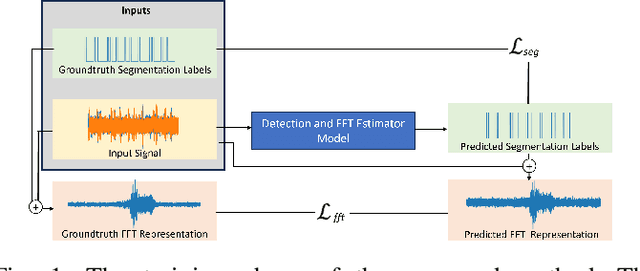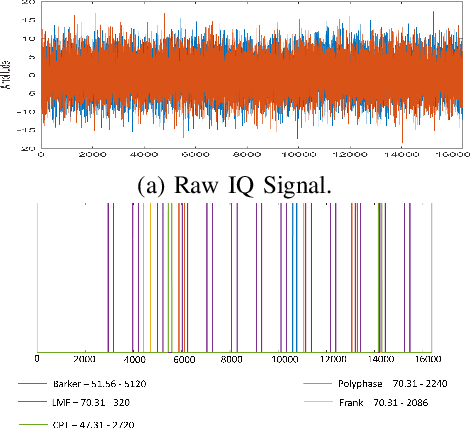Terrence Martin
Radar Signal Recognition through Self-Supervised Learning and Domain Adaptation
Jan 07, 2025



Abstract:Automatic radar signal recognition (RSR) plays a pivotal role in electronic warfare (EW), as accurately classifying radar signals is critical for informing decision-making processes. Recent advances in deep learning have shown significant potential in improving RSR performance in domains with ample annotated data. However, these methods fall short in EW scenarios where annotated RF data are scarce or impractical to obtain. To address these challenges, we introduce a self-supervised learning (SSL) method which utilises masked signal modelling and RF domain adaption to enhance RSR performance in environments with limited RF samples and labels. Specifically, we investigate pre-training masked autoencoders (MAE) on baseband in-phase and quadrature (I/Q) signals from various RF domains and subsequently transfer the learned representation to the radar domain, where annotated data are limited. Empirical results show that our lightweight self-supervised ResNet model with domain adaptation achieves up to a 17.5\% improvement in 1-shot classification accuracy when pre-trained on in-domain signals (i.e., radar signals) and up to a 16.31\% improvement when pre-trained on out-of-domain signals (i.e., comm signals), compared to its baseline without SSL. We also provide reference results for several MAE designs and pre-training strategies, establishing a new benchmark for few-shot radar signal classification.
Automatic Radar Signal Detection and FFT Estimation using Deep Learning
Feb 29, 2024



Abstract:This paper addresses a critical preliminary step in radar signal processing: detecting the presence of a radar signal and robustly estimating its bandwidth. Existing methods which are largely statistical feature-based approaches face challenges in electronic warfare (EW) settings where prior information about signals is lacking. While alternate deep learning based methods focus on more challenging environments, they primarily formulate this as a binary classification problem. In this research, we propose a novel methodology that not only detects the presence of a signal, but also localises it in the time domain and estimates its operating frequency band at that point in time. To achieve robust estimation, we introduce a compound loss function that leverages complementary information from both time-domain and frequency-domain representations. By integrating these approaches, we aim to improve the efficiency and accuracy of radar signal detection and parameter estimation, reducing both unnecessary resource consumption and human effort in downstream tasks.
Multi-stage Learning for Radar Pulse Activity Segmentation
Dec 15, 2023



Abstract:Radio signal recognition is a crucial function in electronic warfare. Precise identification and localisation of radar pulse activities are required by electronic warfare systems to produce effective countermeasures. Despite the importance of these tasks, deep learning-based radar pulse activity recognition methods have remained largely underexplored. While deep learning for radar modulation recognition has been explored previously, classification tasks are generally limited to short and non-interleaved IQ signals, limiting their applicability to military applications. To address this gap, we introduce an end-to-end multi-stage learning approach to detect and localise pulse activities of interleaved radar signals across an extended time horizon. We propose a simple, yet highly effective multi-stage architecture for incrementally predicting fine-grained segmentation masks that localise radar pulse activities across multiple channels. We demonstrate the performance of our approach against several reference models on a novel radar dataset, while also providing a first-of-its-kind benchmark for radar pulse activity segmentation.
Multi-task Learning for Radar Signal Characterisation
Jun 19, 2023



Abstract:Radio signal recognition is a crucial task in both civilian and military applications, as accurate and timely identification of unknown signals is an essential part of spectrum management and electronic warfare. The majority of research in this field has focused on applying deep learning for modulation classification, leaving the task of signal characterisation as an understudied area. This paper addresses this gap by presenting an approach for tackling radar signal classification and characterisation as a multi-task learning (MTL) problem. We propose the IQ Signal Transformer (IQST) among several reference architectures that allow for simultaneous optimisation of multiple regression and classification tasks. We demonstrate the performance of our proposed MTL model on a synthetic radar dataset, while also providing a first-of-its-kind benchmark for radar signal characterisation.
 Add to Chrome
Add to Chrome Add to Firefox
Add to Firefox Add to Edge
Add to Edge